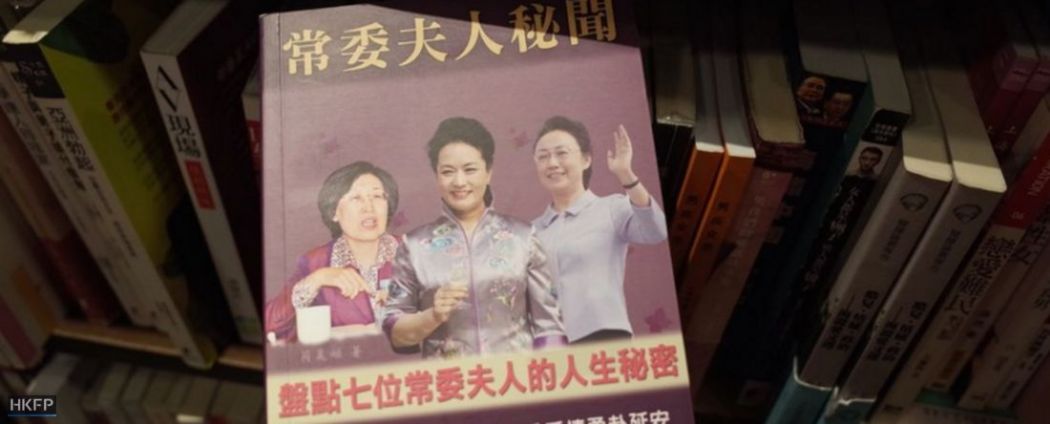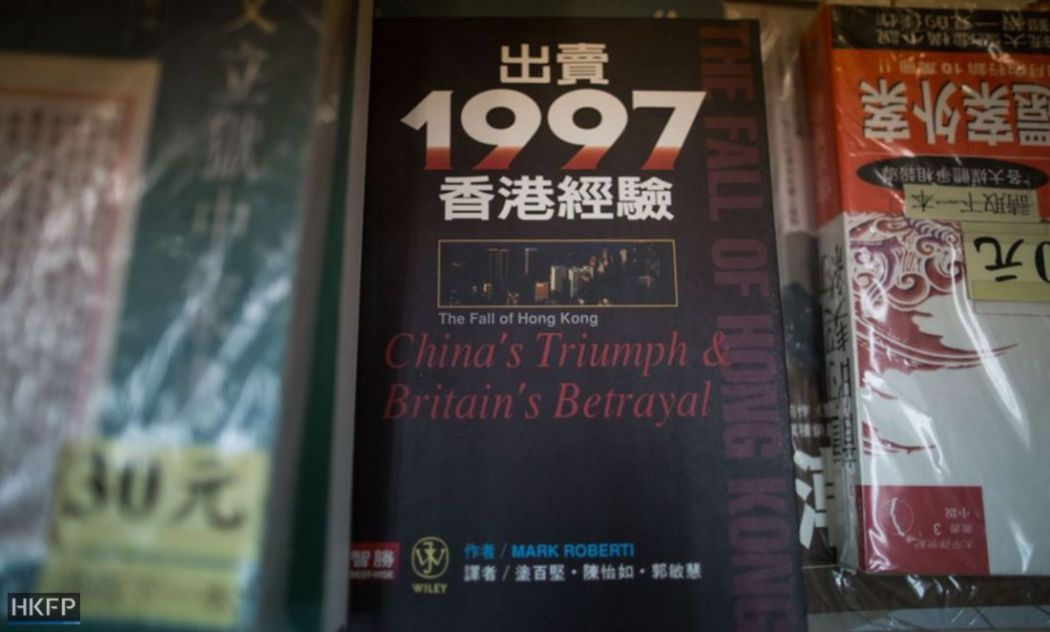“Peng Liyuan quietly pushed open that half-closed door in the General’s Building, like a wisp of soft wind. The house was silent and empty except for one room where light came out, that was Li Hui’s bedroom…’Oh Lili, you are so nice. You are my…’ before he could finish talking, Peng Liyuan stuffed her sweet soft tongue into his mouth…”
The story of how China’s first lady, Peng Liyuan lost her virginity is described in amazingly intimate and erotic detail. The book sits among other paperbacks promising more scandalous anecdotes about Chinese leaders’ love lives in a bookstore in Causeway Bay, Hong Kong’s bustling shopping district.

For decades, Hong Kong publishers have printed and sold books on stories untold, and forbidden to be told, in China. While the quality and credibility of these books vary greatly, they are increasingly popular among mainland tourists, who have few other ways to inform themselves on taboo topics. Publishing banned books was a decent and risk-free business until recently when five people from the Mighty Current publishing house vanished one after another. The last one is widely believed to have been “abducted” in Hong Kong and sent to mainland China through secret channels.

The publishers’ serial disappearances have stoked “white terror” fear in Hong Kong, a rare corner of freedom in China. The city’s pro-democracy forces accused Chinese law enforcement agencies of trespassing into the Hong Kong jurisdiction and making an illegal arrest. Anson Chan, Hong Kong’s former No.2 government official, told the BBC: “If the abduction is proven true then I think you are spelling the death knell for ‘one country, two systems’. You can forget about it. Nobody would feel safe in Hong Kong.”
An oasis of freedom no more
Lee Bo, one of the operators of the Causeway Bay Bookstore, which is owned by Mighty Current, disappeared on December 30 after picking up books for a customer from a warehouse in Chai Wan, an industrial area at the eastern end of Hong Kong Island. Just weeks before, Lee had gone to the police to report the disappearances of his three colleagues, who went missing in Shenzhen and Dongguan in neighbouring Guangdong province. A fourth colleague, Gui Minhai, was taken away by unidentified men from his holiday home in Thailand in October. Thai authorities are believed to have handed Gui to Beijing along with two other Chinese dissidents.

If the city was alarmed by the first four missing reports, the fifth one had an explosive effect as it happened on Hong Kong soil. Pro-democracy activists marched in the streets demanding Beijing “return” the booksellers. Local media carried 24-7 coverage of the story. Legislators pressed the government to seek answers from mainland police. Even the city’s unpopular Chief Executive Leung Chun-ying came out to say it is “unacceptable” and “against the law” if mainland law enforcement agents are found to have carried out duties in Hong Kong.
[mks_pullquote align=”right” width=”250″ size=”18″ bg_color=”#0b005e” txt_color=”#ffffff”]Choi said she heard another voice on the phone reminding her husband to say he would receive “lenient” treatment if he cooperated.[/mks_pullquote]Lee’s wife, Choi Ka-ping, told local media that her husband thought, as long as he stayed in Hong Kong, he would be fine. “We have been very cautious in recent years, we dared not go to mainland China… He told me, ‘How can there be a problem if I stay in Hong Kong? There are so many people in the streets, how can they just snatch someone?’”
Mysterious circumstances
The night Lee went missing, he made two phone calls back home to his wife. The 65-year-old, born and raised in Hong Kong, called from a Shenzhen number and spoke in Mandarin instead of his native Cantonese. He said he was assisting an investigation and would not come home in the near future. The second time Lee called, he asked his wife Choi to stay quiet about the incident. According to an Apple Daily report, Choi said she heard another voice on the phone reminding her husband to say he would receive “lenient” treatment if he cooperated.

Choi listened, and it wasn’t until nearly two days later – on New Year’s Day – that she reported the incident to the police and started talking to the media. The police listed it as a missing person case. Hong Kong Customs said it had no record of Lee crossing the border. Pan-democratic politicians said the authorities should investigate the case with a greater level of seriousness while pro-Beijing politicians urged the public “not to speculate.” Calling from a mainland phone number does not necessarily mean the person was physically in mainland China, said former security minister Regina Ip Lau Suk-yee.

However, that doubt was quickly erased when Taiwan’s Central News Agency published a handwritten letter by Lee which was faxed to them on January 4. In the letter, Lee said he was indeed in the mainland and he went there “by his own means” to assist in an unspecified investigation. “My current situation is good, everything is normal,” the letter, addressed to the Causeway Bay Bookstore’s new owner “Mr. Chan”, read.
Interestingly, the letter was written in a mixture of traditional Chinese characters, which are used in Hong Kong, and simplified characters, which are used in the mainland. This prompted speculation that Lee may have been subtly sending a message for help.
Similar “safety calls” were also made by the other missing people to their families. According to a report by Initium Media, the bookstore’s founder and manager Lam Wing-kei as well as Mighty Current’s shareholder Gui Minhai both called their wives on November 6 and said essentially the same thing: “I am safe, will return home after a period of time, do not worry.” Lam, 60, and Gui, 51, both went missing in October.
Cheung Chi-ping, a manager at Mighty Current, was taken away by unidentified people from his wife’s home in Dongguan on October 24. Witnesses told Initium Media that more than a dozen armed men in plain clothes surrounded the building in the dramatic abduction. Despite this, a man who claimed to be Cheung’s brother insisted the 32-year-old was safe.

“First and Foremost a Chinese citizen”
Lee holds a UK passport. This prompted visiting British Foreign Secretary Philip Hammond to raise the issue with Beijing at a press conference this week. “These people have gone missing – Mr Lee Bo, who is a British passport holder, has gone missing – and we have urgently inquired both of Hong Kong authorities and of the mainland Chinese authorities what, if anything, they know of his whereabouts.”
However, Chinese Foreign Minister Wang Yi, speaking alongside Hammond, rebutted: “Based on the Basic Law of Hong Kong and China’s nationality law, the person in question is first and foremost a Chinese citizen.”
Beijing claims absolute authority over all Hong Kong affairs, and it isn’t the first time a Hong Kong resident’s foreign citizenship failed to help them in the face of mainland law enforcement authorities.

In 2014, veteran Hong Kong journalists Wang Jianmin and Guo Zhongxiao, who each ran a magazines specialising in mainland political affairs, appeared in a Shenzhen court following a 17-month-long detention. The pair, who were charged with running illegal publications, are still awaiting sentencing. Wang is an American citizen.
[mks_pullquote align=”right” width=”250″ size=”18″ bg_color=”#0b005e” txt_color=”#ffffff”]”I think more and more people will want to buy these books… people will wonder what books sparked this [crackdown].”[/mks_pullquote]Lee’s colleague Gui Minhai is a Swedish citizen. The Swedish foreign ministry told the Guardian that its embassies in Bangkok and Beijing have raised Gui’s case with high-level Thai officials following his abduction in Thailand.
“Promotion” for banned books
The People’s Recreation Community sits on the second floor of a narrow building across from Time Square in Causeway Bay. Like the Causeway Bay Bookstore, it is one of about 110 “upstairs bookstores” in Hong Kong – stores which cannot afford the high rent of street-front shops and are typically tucked in old low-rises among nail and hair salons.
Owing to its large collection of books banned in mainland China as well as items like foreign baby milk formula, the bookshop and cafe is hugely popular among mainland tourists.

It has been “business as usual” since the strange disappearances of their peers just a few blocks away, the manager of People’s Recreation Community told HKFP.
Shang Chao, a 31-year-old trade company clerk from Shenzhen, has just bought two books about Tibet and a novel. He said the missing publishers incident will give a boost to banned books’ popularity.
“After this incident I think more and more people will want to buy these books… people will wonder what books sparked this [crackdown].”

It’s not clear whether the disappearances of Causeway Bay Bookstore publishers are linked to any particular publication. But according to the Hong Kong Alliance in Support of Patriotic Democratic Movements in China, an influential pro-democracy group, some of those missing were warned over a book about President Xi Jinping’s past lovers, which has yet to be published.
Like the book about Xi’s wife Peng Liyuan’s first sexual experience, this could just be another sensational title which cannot be taken too seriously. Books like these only sell well for a short period of time, according to the manager of Luck Win Books in Mong Kok.

“There are several types of banned books. One kind is about political gossip, the authors usually use pseudonyms, and their sources and the books’ content are hard to verify. You don’t know if what they say is true or false. Another type is credited to real people… for example, books like the Prisoner of the State: The Secret Journal of Premier Zhao Ziyang – these sell well for a long time,” said Mr Tsang.
It is precisely such dubious political gossip which irks Beijing. The Global Times, a nationalistic tabloid, ran a commentary this week attacking the Causeway Bay Bookstore. Many of the political books sold by the bookstore “contain malicious fabrications”, the Global Times said. “Those books, through various channels, entered the mainland, becoming the source of political rumours… Although the Causeway Bay Bookstore is in Hong Kong, it maintains its existence by creating trouble for the mainland society.”

However, a long-term reader of banned political books, who declined to give his name, said the credibility of these books was not the point. The 83-year-old mainland-born Hong Kong resident, who went to check if the Causeway Bay Bookstore was open on Wednesday, said: “I have dozens of these books… Some of them I believe, some I don’t. But the Communist Party cannot have everybody say the same things.”
Shang said Chinese authorities have gone too far in the crackdown on banned book publishers in Hong Kong. “I think all the people on the mainland who have some knowledge [of the incident] will be outraged.”

The Causeway Bay Bookstore has been mostly closed for more than a week. Multiple attempts by HKFP to contact Lee’s wife Choi since Thursday have been unsuccessful. Calls to the bookstore also went unanswered. Choi, herself a writer, went to the police station to cancel her husband’s missing report after he faxed a handwritten letter to say “everything was normal.” The Hong Kong Police confirmed to HKFP that it is still investigating the case as a missing person’s report can only be canceled by the missing person themselves.
In footage obtained by HKFP on Tuesday, a friend of Lee’s who helps run the Causeway Bay Bookstore, said he feared he would be the sixth person to go missing.

However, not everyone is afraid. At Luck Win Books, manager Tsang said he will continue to sell banned books even after bookstore chain PageOne pulled them from shelves: “You have to believe Hong Kong is still ruled by law and it is an open society. Then you won’t be too afraid.”

